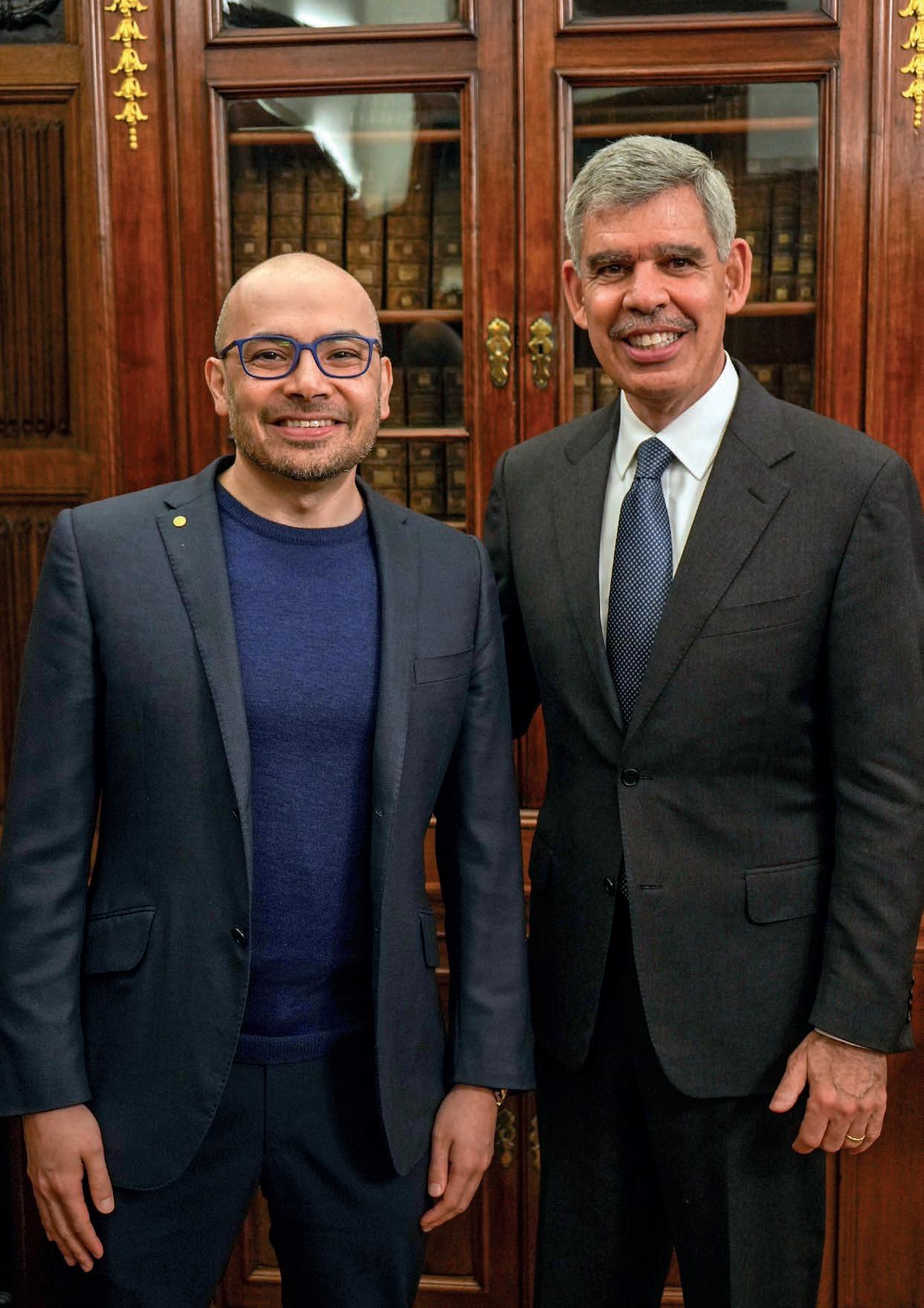

The Thinking Game
Sir Demis Hassabis & The President
From the Lodge

As my term as President of Queens’ nears its end, I remain in awe of our community’s achievements, both in Cambridge and beyond. From our students’ exciting intellectual discoveries and our Fellows’ insightful research to outstanding artistic productions and vibrant Society events, our members continue to earn well-deserved recognition, engagement, and accolades—and our community continues to go from strength to strength.
In this edition of The Bridge, we celebrate recent accomplishments and cherish fond memories. We extend our warmest congratulations to the five Queens’ members recognised in the New Year Honours, including Stephen Fry (1978), whose Knighthood is yet another tribute to his tireless work and profound impact on so many lives. We celebrate again our Nobel Laureate, Demis Hassabis (1994) and we welcome Reid Hoffman to our community.
From traditional drinks receptions and the London Carol Service to special gatherings worldwide, I have greatly enjoyed connecting with our alumni over the past few months. Your feedback and ideas are invaluable—they help us improve what we do and expand what is possible. Thank you.
I also want to express my deep gratitude to the donors whose generosity enables us to move forward with exciting student accommodation initiatives across key parts of our estate. The modernisation and decarbonisation of Erasmus remain on time and on budget, and we will soon intensify the phased implementation of our exciting Owlstone Croft project.
None of this would be possible without the unwavering philanthropic support of our alumni and friends. On behalf of both current and future generations of students, a heartfelt thank you.
Finally, I am profoundly grateful to you all for making this the best job in my professional career. Queens’ has been—and will always be—to borrow my daughters’ words, my happy place
With my very best wishes,

Mohamed A El-Erian (1977)
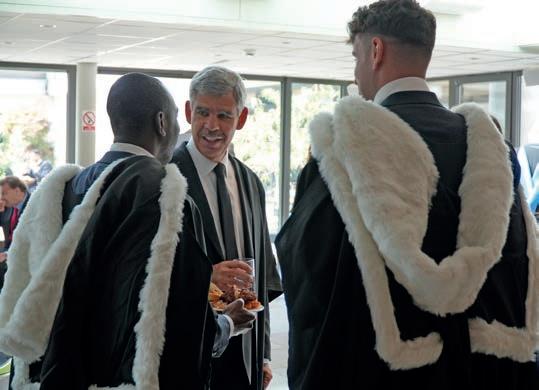
Undergraduate graduation, 2022.

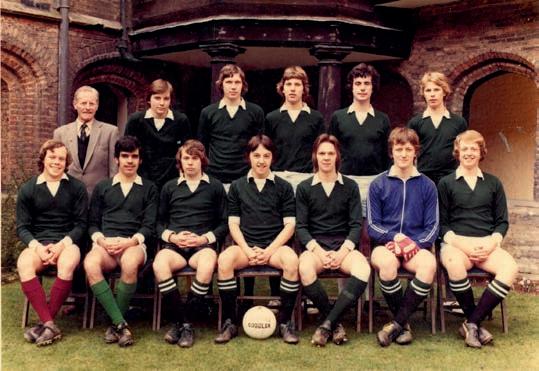
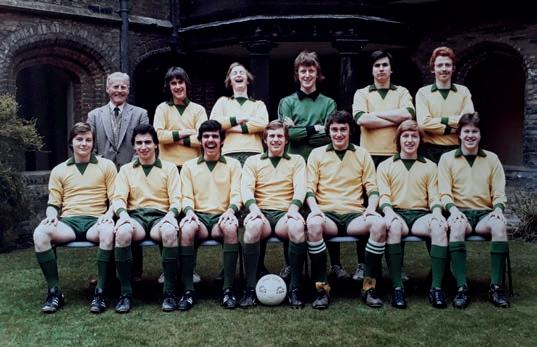
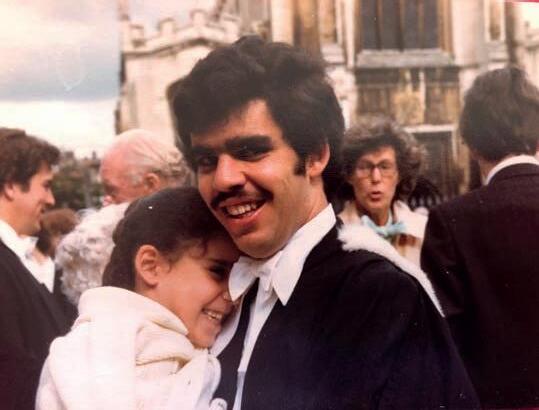
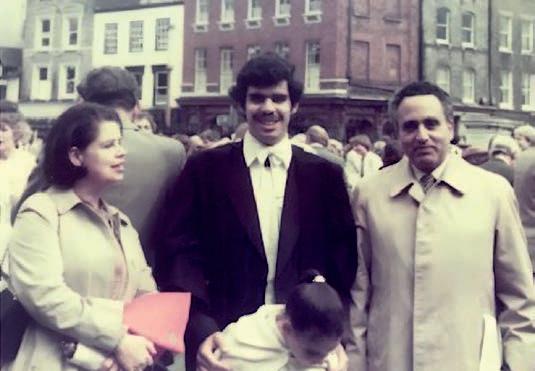
in
Left: On the Mathematical Bridge with Head Porter Dave Steward and Porter Sheila Collins in November 2024.
1977 matriculation photograph, including Mohamed (second row, central).
Mohamed (first row, third from left) and the 1978-79 Queens’ 1st XI football team.
Mohamed (first row, second from left) with the 1977-78 Queens’ 2nd XI football team.
Graduation
June 1980, with his sister, Ola, and parents.
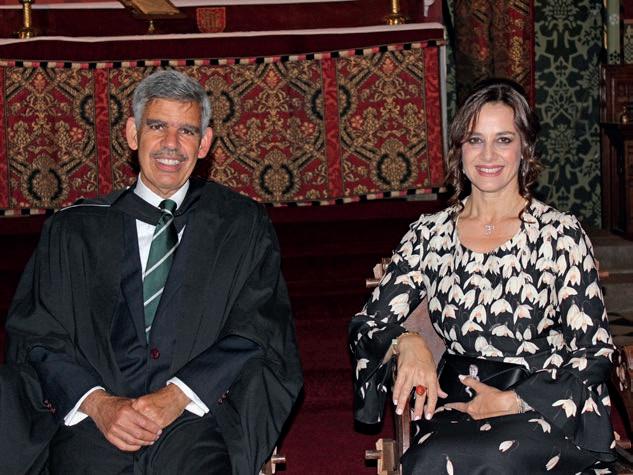
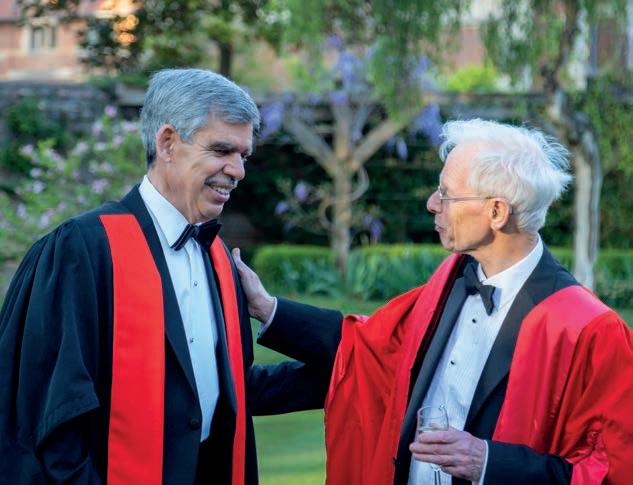
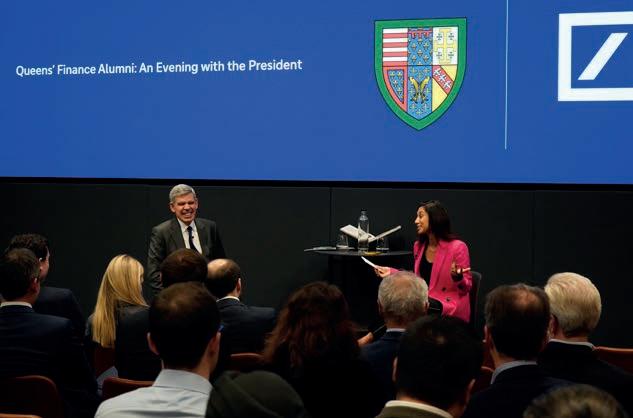
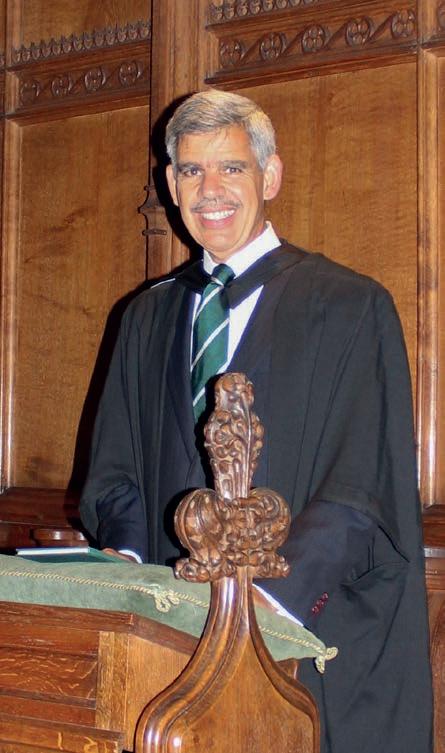
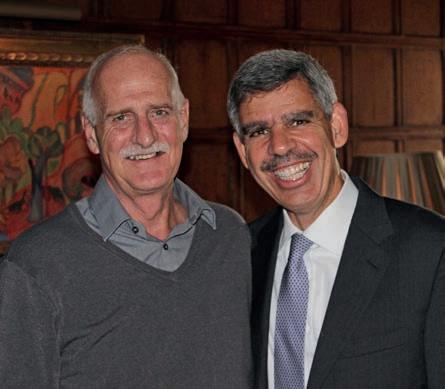
Clockwise from top left:
With Anna El-Erian at his installation, 2020. Mohamed’s installation as President in 2020
With Andy Cosh (1968, Life Fellow).
In conversation with Anum Shahab (2008) – Finance Event at Deutsche Bank in 2024.
With Professor James Diggle at the 2022 Benefactors Ceremony and Feast.
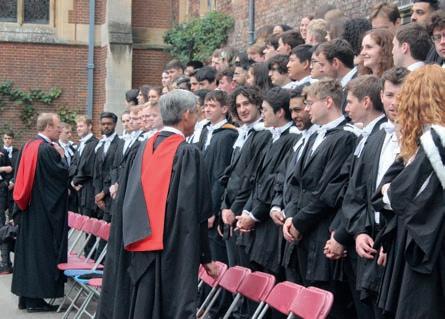


Clockwise from top left: Undergraduate graduation, 2022.
In conversation with Baroness Dambisa Moyo (Honorary Fellow) in May 2023.
Shaking hands with the late Queen Elizabeth II, Patroness of Queens’, during her visit to the College in 2019.
With Victoria Ayodeji (2018) (left) and Esther Ademeno (2018) (right) at their graduation ceremony in July 2021.
With Sir Stephen Fry (1978), Sir Demis Hassabis (1994) and Reid Hoffman in March 2025.
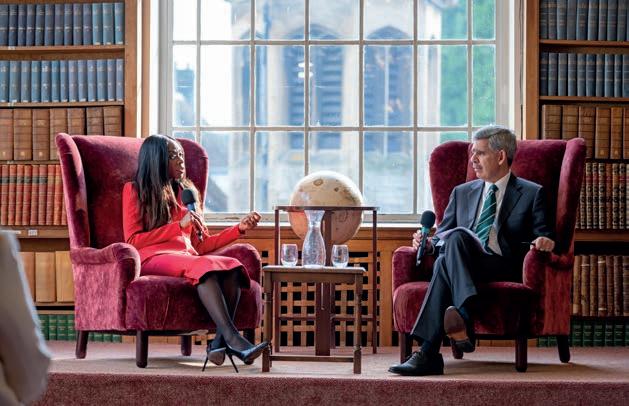
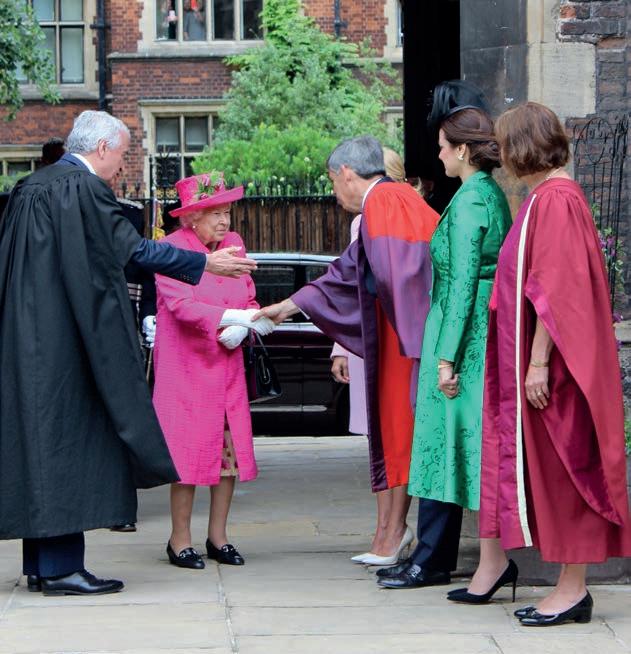
Please send your news & photos to
From our Alumni
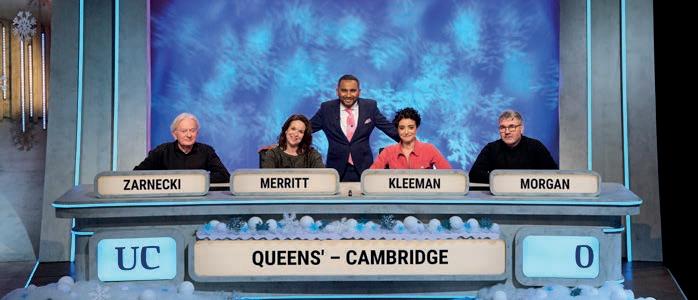
University Challenge Christmas Special
On December 30th, many tuned in to watch Queens’ alumni take on fellow Cambridge alumni from Emmanuel in a Christmas Special heat of BBC2’s University Challenge The Queens’ team, captained by Jenny Kleeman (1998), alongside Professor John Zarnecki (1968), Stephanie Merritt (1993), and Richard Morgan (1984), showcased their knowledge with a commanding win, scoring 175 to Emmanuel’s 95.
Advancing to the semifinals as one of the four highest-scoring teams, Queens’ faced Churchill in a nail-biting match. Once again, our team emerged victorious with a score of 105 to Churchill’s 95.
The final, held on January 3rd, saw Queens’ pitted against Durham University. In a gripping contest, Queens’ narrowly missed out, with Durham clinching the victory at the last moment by securing the decisive ‘starter for ten’ just before the whistle. The final score was Durham 125, Queens’ 120.
All episodes of the University Challenge Christmas Special 2024/25 are available to stream on BBC iPlayer.
The Thinking Game
A feature-length documentary following the journey of Sir Demis Hassabis (1994) and DeepMind had its UK premiere in London this March.
As mentioned in the previous edition, Sir Demis was jointly awarded the Nobel Prize in Chemistry for DeepMind’s AlphaFold 2. Another Queens’ alumnus played a pivotal role in the award-winning project. Dr Tim Green (2006) joined DeepMind in 2016 and became part of the AlphaFold team in 2017. He co-led as Tech Lead (the lead Research Engineer) during the development of AlphaFold 2 and, subsequently, AlphaFold 3, which was released in 2024.
“It’s been very exciting to have the impact of this work recognised in a Nobel prize,” Tim shared with us in November.
To keep up to date with alumni news and events, and what the Alumni and Development Office is currently up to, follow our account on X @QueensAlumni
New Year Honours
In January, five Queens’ alumni received recognition in the King’s New Year Honours.
Sir Stephen Fry (1978, Honorary Fellow) for services to Mental Health Awareness, the Environment, and to Charity.
Mr James Palmer CBE (1982) for services to Business and to Law.
Mr Thomas Solloway OBE (1995) for services to Defence.
Professor Robert Wilkinson OBE (1981) for services to Infectious Disease Research.
Dr Matthew Cain MBE (1994) for services to LGBTQ+ Culture.
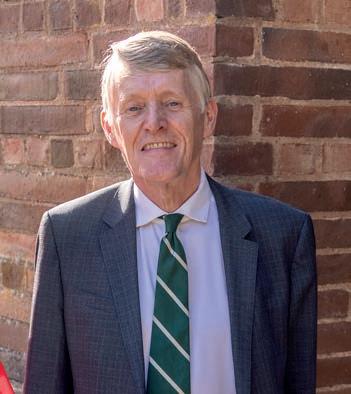
Dr Paul Ellison (1978)
Dr Paul Ellison (1978) was recently elected a Fellow of the Royal Historical Society (FRHistS). He is President of the American Beethoven Society and teaches musicology at San José State University in California. He is also a regular speaker at the Three Choirs Festival each summer.

HRH the Crown Prince of Bahrain
The College was honoured to welcome His Royal Highness Crown Prince Salman Bin Hamad Al Khalifa (1992), Prime Minister of Bahrain, in October.
His Royal Highness studied for an MPhil in International Relations at Queens’.
The President, Dr Mohamed El-Erian, and Ms Anna El-Erian hosted His Royal Highness for lunch in The Lodge. Following the meal, His Royal Highness toured the College.
BBC Radio 3 – Private Passions
Queens’ Alumnus Honoured with PECASE
In January, Dr Matthew Lakin (2002) was awarded the Presidential Early Career Award for Scientists and Engineers (PECASE) by President Biden. The award is described as ‘the highest honour bestowed by the U.S. government on outstanding scientists and engineers early in their careers.’
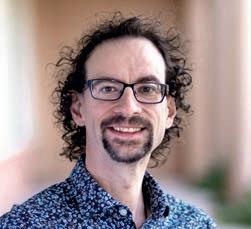
Dr Lakin is currently a tenured Associate Professor at the University of New Mexico, where he also holds a courtesy appointment in the Department of Chemical & Biological Engineering. “My group works on interdisciplinary computational and experimental aspects of molecular computing, DNA nanotechnology, and synthetic biology,” he explained.


Queens’ does Countdown
Dr Tom Crawford (2012) made history as Countdown’s first-ever male arithmetician, stepping in for Rachel Riley for a three-week residency as the numbers expert on the iconic Channel 4 show.
Welcomed by host Colin Murray, Tom admitted to being “a little nervous but very excited” ahead of his debut episode, which aired on 24th February. During his first week, he was joined in Dictionary Corner by fellow Queens’ alumnus Sir Stephen Fry (1978), who quipped at the close of the first episode: “He’s fine. His handwriting’s a little smaller than Rachel’s.” Resident lexicographer Susie Dent added: “I think he fitted right in. I’m very impressed.”
Dr Crawford’s episodes are available to view on Channel 4’s streaming service.
Professor Anthony Kessel (1990), National Deputy Medical Director (Specialised Services) for the NHS, professor at the London School of Hygiene & Tropical Medicine, and awardwinning children’s author, appeared as a guest on BBC Radio 3’s Private Passions in February.
In conversation with host Lord Michael Berkely, Anthony discussed his upbringing, education, and medical career, as well as his children’s detective fiction series Don’t Doubt the Rainbow, which weaves in helpful tools for mental health and wellbeing.
Highlighted as one of The Times shows of the week, the episode is available on BBC Sounds, with a shorter version accessible on major podcast platforms.

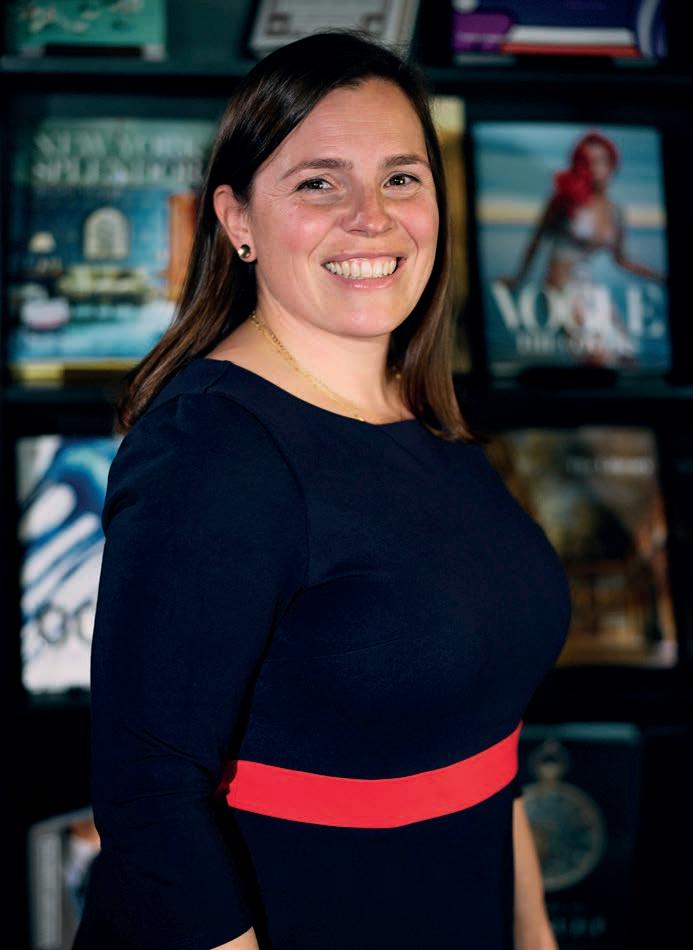
Dr Marla Fuchs
Executive Programme Director Institute of Computing for Climate Science
Department of Applied Mathematics & Theoretical Physics
Began career with a Bachelor of Science in Mechanical Engineering at Rensselaer(RPI), in New York in 2003 and completed a MPhil in Engineering for Sustainable Development at the University of Cambridge in 2007
Has worked in higher education for 15 years
Joined Queens’ in 2022 as a Bye Fellow, became DEI Lead Fellow in 2024
When did you join Queens’, and what role has the College/University played in your academic journey?
I first joined the University in 2007 to pursue an MPhil in Engineering for Sustainable Development at Darwin College, located just across the street. From 2015 to 2022, I held several positions within the University, focusing on expanding academic impact beyond traditional boundaries and leading sustainable research projects.
In 2022, I became a Bye-Fellow at Queens’ College, assuming the role of Executive Programme Director for the Institute of Computing for Climate Science. In this capacity, I lead the Institute within the Department of Applied Mathematics and Theoretical Physics. Since joining Queens’, I’ve found a role in leading Diversity, Equality, and Inclusion within the College. College life brings together the intersection of students, academic disciplines and cultures, and I find it rewarding to be a part of and contribute to that convergence.
What do you enjoy most about being part of the Queens’ community, beyond your academic and research work?
Queens’ provides an opportunity to stretch my mind, as it brings together students and scholars with interests very far from my own. Sharing a meal with the foundation students, or engaging in a lunchtime conversation with Fellows, offers rich intellectual food for thought. My curiosity is piqued by people who are knowledgeable about subjects I know much less about. Additionally, working alongside staff, students and Fellows who are committed to working towards an ever more inclusive community is deeply fulfilling. As a lifelong learner and football player, I am also grateful for the opportunity to share time on the pitch with our women’s and non-binary football team, Queens’ Greens.
What is the TIGR2ESS programme, and how has it impacted sustainable agriculture in India?
The TIGR2ESS (Transforming India’s Green Revolution by Research and Empowerment for Sustainable food Supplies) programme was a pioneering research initiative designed to shape a second Green Revolution in India. As Chief Operating Officer, based in the Department of Plant Sciences, I helped steer the programme and led on the collaborative structure across more than 20 institutions across the UK and India. TIGR2ESS addressed key challenges such as demographic changes in rural communities and the empowerment of female farmers. By bringing together researchers, the initiative developed innovative solutions to increase crop productivity while ensuring water security, stable yields, and resilient food supply chains.
What role does the Institute of Computing for Climate Science (ICCS) play in advancing climate modelling?
The Institute of Computing for Climate Science (ICCS) is dedicated to advancing climate modelling by equipping scientists with more powerful computational tools. By integrating machine learning, artificial intelligence, and big data analysis into climate science, ICCS seeks to improve the accuracy of climate predictions. ICCS, like TIGR2ESS, draws strength from the interdisciplinarity of scientists coming together to work on this critically important area of research. These advanced tools are essential to make decisions about how to prepare for and mitigate the impacts from climate change.
How can interdisciplinary initiatives like TIGR2ESS create lasting change?
Interdisciplinary initiatives like TIGR2ESS are crucial for creating sustainable, long-term change. The programme built a legacy of
collaboration, fostering approaches and communication strategies that address the health, well-being, and empowerment of rural communities. For example, the mobile teaching kitchen (MTK) microenterprise model in Kolkata, Sanghol, and Delhi empowered women with skills to prepare healthy, sustainable meals while equipping them with valuable, transferable livelihood skills. The MTK model has been sustained at its base with several lateral adaptations within India in indigenous communities and across borders in Mexico, the USA, and in the UK, empowering underserved populations in all four countries. Additionally, over 9,000 farmers were trained, saving 58 billion litres of water and reducing reliance on dwindling groundwater supplies. Through research into the development of heat- and drought-resistant crops, TIGR2ESS contributed to the resilience of India’s agricultural sector. The impact of TIGR2ESS was larger than the sum of its parts, due to the multiplicative factors of interdisciplinary collaborations.
What are some of TIGR2ESS’ most rewarding outcomes/inspiring stories? One of the most rewarding aspects of TIGR2ESS has been the formation of a powerful international, interdisciplinary network of researchers committed to supporting vulnerable communities facing climate change. This collaboration led to policy changes promoting water conservation, as well as the empowerment of women entrepreneurs. TIGR2ESS also educated communities about food security and nutrition. Notably, the programme’s research contributed to a Punjab Policy Notification in 2021, during the lifetime of the programme. Beyond the programme, the MTK model is now being adapted for spread and scale through the Office of the Chief Scientific Advisor to the Indian Prime Minister.
“ Queens’ provides an opportunity to stretch my mind, as it brings together students and scholars with interests very far from my own.”
Have you faced challenges in advocating for inclusivity in scientific research? What steps can institutions like Queens’ take to promote diversity in STEM fields?
Promoting inclusivity in scientific research offers both challenges and opportunities. A primary challenge is ensuring that diverse voices are not only present but also genuinely heard and valued. Queens’ College has taken significant strides by actively engaging in diversity initiatives. In my work, I have sought creative solutions to overcome existing barriers. For instance, I have fostered southsouth collaborations by sharing best practices between Ethiopia and India through TIGR2ESS, and I facilitated the involvement of ICCS software engineers at the African Institute of Mathematical Sciences (AIMS) in Rwanda. As the Global South is expected to face some of the harshest impacts from climate change, it is crucial that these regions also lead the scientific efforts addressing these challenges.
Mentorship can be a key factor in increasing diversity in STEM. Have you had any mentors who shaped your career, and how do you approach mentorship yourself?
Throughout my career, I have been fortunate to have several mentors who have shaped my professional and personal growth, and helped me to maintain focus. Their guidance has been invaluable, providing me with perspective, encouragement, and the confidence to take risks. In my approach to mentorship, I aim to offer support and encouragement to those who are in earlier stages of their careers, particularly those from underrepresented backgrounds in STEM. I believe mentorship should be about empowering others, helping them navigate challenges, and inspiring them to push the boundaries of their potential.
What advice would you give to students interested in pursuing careers in environmental sustainability or scientific research?
You can make a difference. At this early stage in your career it can feel overwhelmingly like your impact on a scientific area or environmental sustainability might not be consequential. Or that the enormity of the challenges is just too great. But I would encourage you to appreciate that everyone who has ever made a difference has felt that way. All breakthroughs begin with uncertainty. Even the greatest scientific minds often pursue their research with fears of failure. I would encourage them to take a look at Darwin’s notebooks, where doubts and questions are plentiful, but they led to ideas that transformed our understanding of life itself.
“ The Student Ambassadors are one of the best parts about working at Queens’; we are really lucky to have a group of students who are so enthusiastic and involved, and who care deeply about widening participation.”
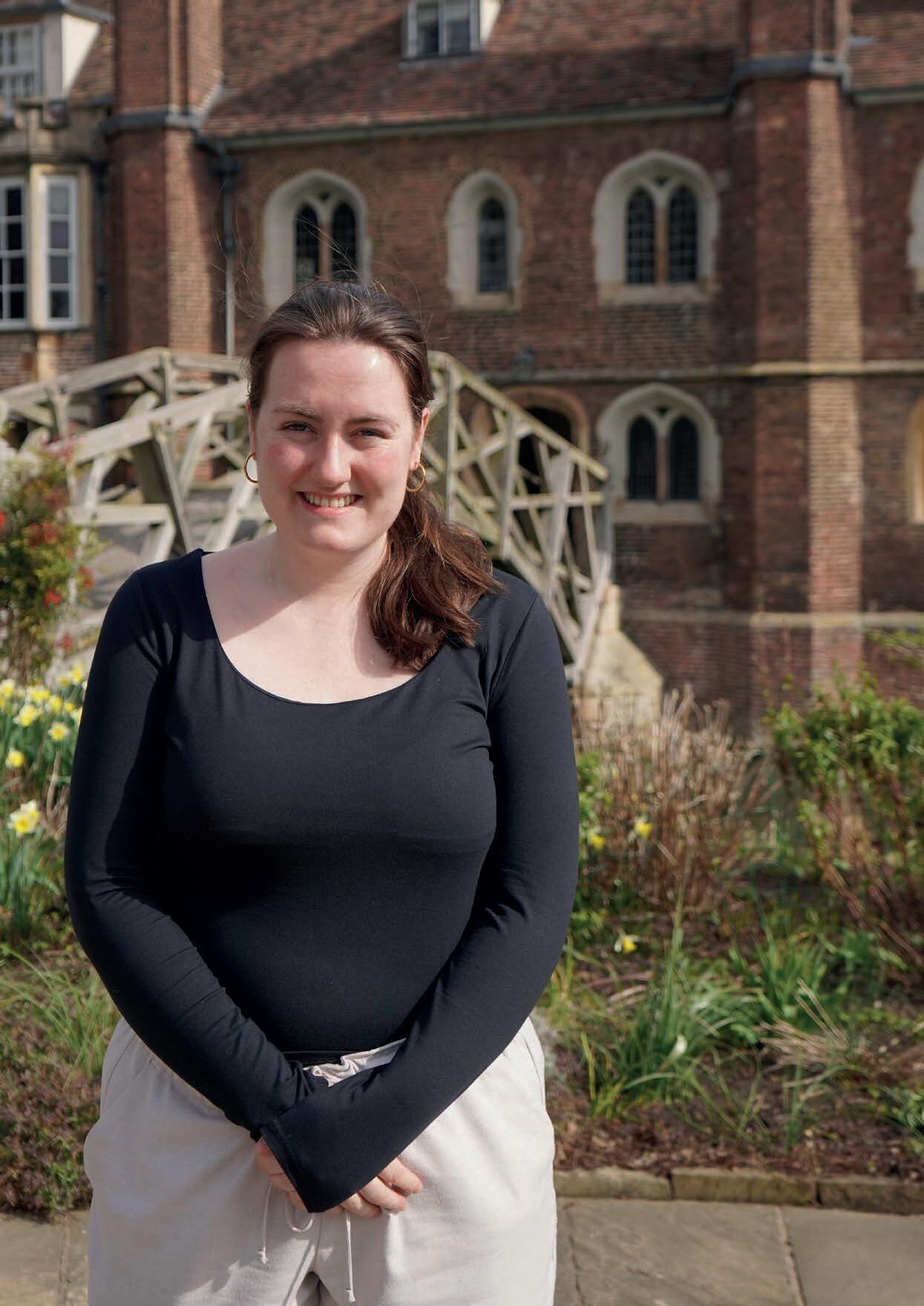
Olivia O’Neill
Schools Liaison Officer – Kent, Medway & Havering
Studied Modern and Medieval Languages at Selwyn College
Spent Year Abroad teaching English in Salamanca and as an intern in Barcelona
JCR Access Officer and CAMbassador whilst studying Passionate about encouraging students to pursue Higher Education and Cambridge
What inspired you to pursue a career in access and outreach, and how did you come to Queens’?
I started getting involved in access and outreach during my first year at Selwyn College, reading Modern and Medieval Languages. I loved meeting prospective applicants and giving tours and talks. We had a fantastic community of Ambassadors working together under our SLOs. Eventually, a friend and I were elected Access Officers for the JCR, and I had a better insight into how Widening Participation works at the college level. I also worked as a CAMbassador for the CAO, and then an Event Supervisor and Session Leader, delivering taster lectures to students.
I benefitted a lot from access and outreach before I applied to Cambridge. I attended a Sutton Trust Summer School and, as the first in my family to go to university, outreach work helped encourage me to pursue higher education. I love working with young people, and being an SLO allows me to speak to students, bust myths, and tell them “You can come here, this place can be for you too”.
I applied for the role at Queens’ during my final exams, because I knew I wanted to keep working in Widening Participation. I was immediately struck by the friendliness of Queens’ and the commitment to widening participation, as well as the strong community of Ambassadors and how the whole College works together to facilitate outreach work. I couldn’t have asked for a better team or a more enjoyable first job!
Could you tell us a bit about your role as SLO? What does a day or week look like for you?
I’m very lucky that working as an SLO is so varied, so each day looks different! I’m often in the office, preparing for visits and getting in touch with schools. I visit our link areas (Kent, Medway and Havering) regularly, giving talks in schools and attending Careers Fairs. I also host visit days into Queens’, where schools come to us for tours, talks, and to learn about university and Cambridge. So, I might have 60 Year 10s in one day, then a group of Year 6s with IntoUniversity the next! I spend a lot of time speaking to people, whether that’s to contact schools or to recruit ambassadors, or liaise with colleagues and external organisations. Right now, I’m working on organising the Queens’ Roadshow, where we send students to visit schools in our link areas. It’s a highlight of the Outreach calendar at Queens’!
Queens’ has a strong commitment to widening participation. What are some key initiatives you are currently running to support students from underrepresented backgrounds?
Queens’ offers lots of initiatives to support underrepresented students in applying to Cambridge. Currently, Cathy Wardle (our Bradford-based SLO) and I are working on a series of webinars called ‘The Art of Being Human’ to promote our arts and humanities subjects. I’ve also started working with an organisation called Icanyoucantoo, who provide mentoring for Year 12s from Havering and other areas in London. We’re running a series of webinars and a visit to Queens’ as part of an Oxbridge programme. We’ve also got the Roadshow coming up, so I’m working with our Student Ambassadors to send them to schools across our link areas to speak to potential applicants. The Student Ambassadors are one of the best parts about working at Queens’; we are really lucky to have a group of students who are so enthusiastic and involved, and who care deeply about widening participation. The highlight of most visits to Cambridge tends to be meeting our students!
We also collaborate with other Colleges and the central University on widening participation events. We’re excited to be hosting a formal for Target Oxbridge, who work with black and mixed-black heritage students, and working with Magdalene on ClickCambridge, delivering webinars to support British Bangladeshi, Pakistani, and Arab students. There are lots of exciting initiatives taking place across Cambridge to help support students from underrepresented backgrounds, and we’re lucky at Queens’ that we get to take part in so many of them!
There’s often discussion about imposter syndrome among students from underrepresented backgrounds. What advice do you give to those who might feel that way?
I think it’s hard to avoid impostor syndrome, especially in an institution like Cambridge, and especially if you are coming from an underrepresented background. I know I struggled with it when I was a student! Even when you’re doing well, you can still feel out of place. My advice would be to remember that you worked hard for your spot at Cambridge, you earned it through your achievements, and you deserve to be here as much as anyone else. Your contributions and experiences are interesting and enrich academia and the
university. If you’re worried about applying because you feel you won’t fit in, I’d encourage you to engage with outreach events, to meet our students and see the diverse and accepting student body we have. When you come to Cambridge, you will find your community –whether that’s through your College, your faculty, or your societies and hobbies.
My advice would be that it’s okay to feel impostor syndrome, and to worry you won’t fit in, but to know that if you are passionate about your subject, and achieving strong academic results, we want to hear from you. There is no one type of Cambridge student, and that’s the best part about this University: we have so many people from different backgrounds, schools, parts of the UK and the world, and it only makes Cambridge better. Our research, our community, and our university are better and more interesting because of the range of people we have here.
What’s the most rewarding part of your job?
Definitely working with students. I’m lucky that in my role I get to speak to so many different students from a wide range of backgrounds and help them make informed choices about higher education. Meeting a young person who is nervous or unsure about Cambridge or going to University and being able to talk to them and answer their questions is a privilege. It’s a job where you are always learning and finding out about new experiences and perspectives you might not have considered. I also really value the range of people I get to work with –Cathy (Dr Wardle, SLO for Bradford), the Admissions and Tutorial Office, the Fellows, student ambassadors, other SLOs and outreach practitioners, external organisations – I learn so much from all of them, and the outreach community is always growing and developing. Working in a College environment and managing long-standing and new relationships with schools means you can see the impact your work has, and that feels very rewarding. Cambridge is an incredible University and a place that really changed my life, and I love sharing with prospective students how Cambridge can be a place for them too.
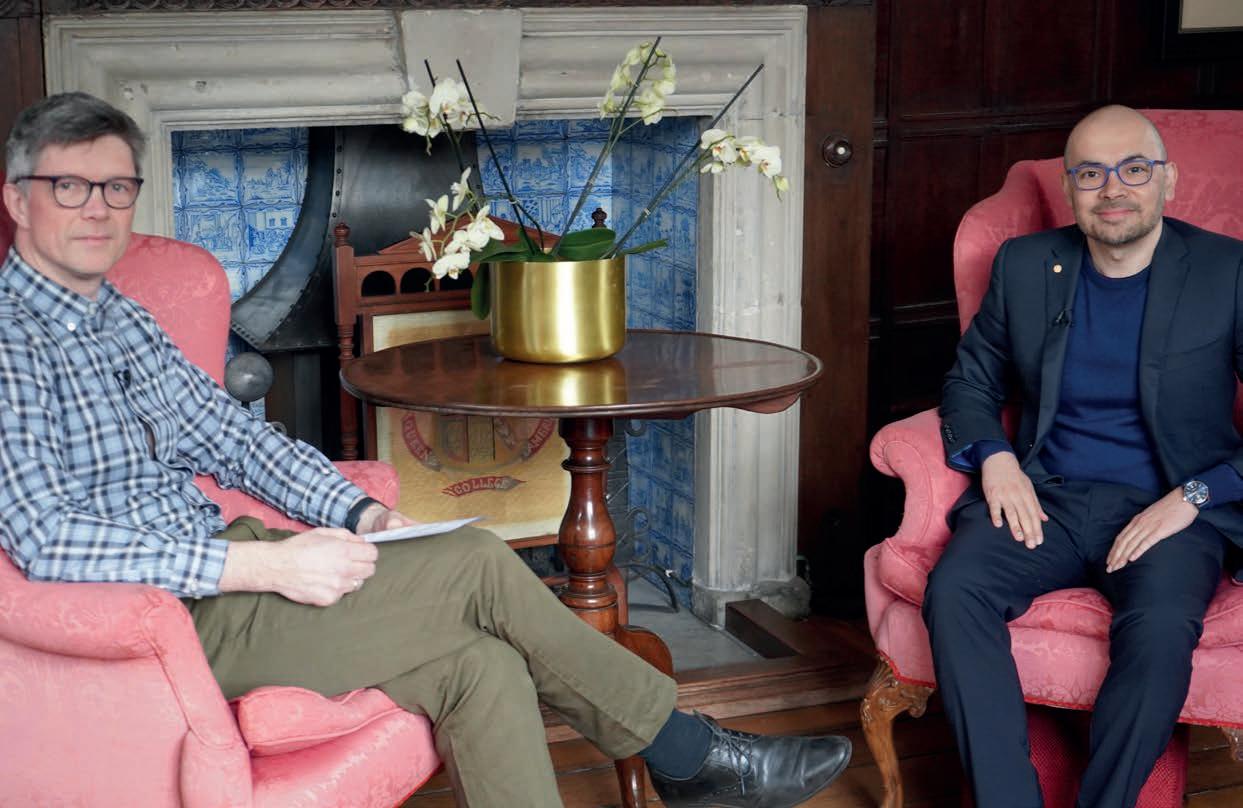
The Future of AI and Scientific Discovery
An interview with Sir Demis Hassabis (1994, Honorary Fellow & Fellow Benefactor)
In March, Professor Alastair Beresford (Robin Walker Fellow in Computer Science) interviewed Sir Demis Hassabis (Co-founder & CEO of Google DeepMind) at Queens’. Their discussion, which included questions submitted by undergraduate and postgraduate students, explored education, entrepreneurship, and AI’s transformative impact.
Education and Research
A: You studied Computer Science here in Cambridge as an undergraduate, and after a period working in the games industry, you completed a PhD in Cognitive Neuroscience at UCL. What was your experience of the Cambridge supervision system, and how did you balance your studies with your broader interests?
D: I think the supervision system is one of the things that makes Cambridge special. It was an incredible opportunity for us as students to learn. I had supervisions not just here at Queens’ but also at other Colleges, depending on the professor. I think a critical reason why it’s so stimulating to be here is that you get the individual attention – I actually found them even more useful than lectures.
As a researcher, you’re trying to balance learning with your own research, and that’s something that I learned to do very well at UCL, and I think it’s an important part of what I do today. It’s not just learning the subject matter but also learning how to do high-quality research and the process behind that.
Gaming
A: Games have been a big theme throughout your life, and you worked in the computer games industry before and after your time at Cambridge. How has the time spent studying board games and working in the computer games industry influenced your career?
D: Games are the common thread running through my life. I’ve used games in three
different ways during my career. First, to train my mind as a chess player for the England junior teams growing up. I think it’s great for training the mind – I encourage schools to include chess in the curriculum. It’s just as useful as maths and computer science for learning logic, visualisation, and planning.
The second was my professional career. I was programming AI for computer games and making big simulation games like Theme Park, and that’s what got me excited about AI in the first place.
Finally, with Google DeepMind, we use games to train our AI systems. Starting with simple games, all the way up to very complicated games like Go with AlphaGo. Maybe there will be a fourth chapter, using AI to make new types of computer games.
Entrepreneurship and Science
A: After you graduated from Cambridge, you worked at a game startup before starting your own games company. After your PhD, you went on to form an AI startup, DeepMind, which then became Google DeepMind. What role do you think startups should play in scientific research?
D: Startups are fantastic vehicles to get a lot done in a short amount of time and get a lot of resources. I’ve always been quite entrepreneurial; I like putting teams together and going after difficult problems. With DeepMind, we were trying to show that it was a modern-day Bell Labs – combining the bluesky thinking that you get in the best academic places like Cambridge with the top engineering, intensity, and pace that you get at the best startups. Hopefully, it’s a bit of a blueprint for other deep tech startups. If you’re approaching something hard, maybe it’s fusion or quantum computing, you can get a lot more resources to bear if you do it in a startup. I think there should be a fluid, two-way system between academia and startups when ideas are mature enough. It’s quite common in the US, at Stanford and MIT, so maybe that would be great for Cambridge and other universities in the UK.
Careers in a Changing World
A: The job market today looks significantly different from when we were looking for our first jobs. How do you think careers in the tech industry might be affected by AI, and what advice would you give to Cambridge students to thrive in this environment?
D: It’s important to use the time you have as an undergraduate to understand yourself better and learn how to learn. The only thing any of us can predict from here is that for the next five to ten years, there is going to be an incredible amount of disruption and change due to technology. Especially AI, but also VR, AR, quantum computing – all of these things are looking like they’re going to be promising. Any time there’s disruption and change, there’s also a huge opportunity. We entered a period like that in the 90s, with the internet, mobile, and gaming. I think we’re in another of those eras, which is exciting, but you’ve got to be very nimble and embrace the new technologies that are coming down the line.
Learn the foundations from the courses at Cambridge and other universities, but in your spare time you should be experimenting with whatever your passionate area is so that you’re up to speed with the absolute latest when you graduate. Then, you can combine that with the best foundational knowledge.
AI and Scientific Discovery
A: You and your colleagues at Google DeepMind have made several seminal contributions to science, including AlphaFold, for which you were recently co-awarded the 2024 Nobel Prize in Chemistry. One of our students also highlighted AlphaProof, which recently achieved a silver medal in the International Mathematical Olympiad. How do you envisage AI will change future research in mathematics, science, and technology?
D: The motivation for me spending most of my career working on AI is that, ultimately, it could be the best tool ever for accelerating scientific discovery. I think we’re about to enter a new golden age of discovery, helped by AI tools. AlphaFold is the best example of that so far. I hope we look back in 10 years and it will be the first of many examples of tools that change areas of science and accelerate it massively. More than 2 million researchers around the world now make use of AlphaFold, and we’re incredibly proud of that impact.
AlphaProof is an amazing system. We’re focusing now on proving things, either by counterexample or other proof methods, but
eventually, the question is, ‘Can AI systems come up with new, interesting conjectures themselves?’ We’re quite close to being able to solve some important conjectures in mathematics with the help of AI. A silver medal IMO is quite difficult already – I took a look at those questions, and they’re pretty hard! There’s still a big leap from solving a conjecture to actually proposing an interesting new hypothesis. That’s the part we don’t know yet, whether AI can or how to make AI do that.
AI, Policy, and Society
A: Many people are concerned about the rapid integration of AI into societal infrastructure, including civil, medical, or educational spaces, yet governments commonly lack a cohesive plan on how to handle this change. What steps do you think governments, us as scientists, or society more broadly should take to try to protect and enhance the world that we live in?
D: It’s a great question, and it’s a very complicated question that I mull on all the time. I think AI is going to be one of the most transformative technologies humanity will ever invent. It’s going to affect every corner of the world, every part of society. There’s going to be enormous benefits to society from these advances, but, on the other hand, it’s a dualpurpose technology. The same technology can be repurposed by bad actors for harmful ends. I think another issue is the risk that’s inherent in the AI systems themselves as they get more sophisticated. Not with today’s models, but maybe in a few years, as they become more able to achieve things autonomously than they do today. It’s going to bring more capable systems, but they also carry more potential for risk.
I think the international community has to come together to agree standards around what we should deploy for and what we shouldn’t, what we should use it for, and how we should build it. What’s been pleasing is the beginning of these international summits. The first one was held in the UK a few years ago at Bletchley Park; the most recent one was just in Paris. I think we need more of those kinds of dialogues across all these different areas so everyone can have input into how this should go.

In My Father’s Day
Dr Jarat Chopra (1986)
This year marks the eightieth anniversary of the end of the Second World War. As the wartime generation of Cambridge fades away, so too does memory of one of the episodes in the history of Queens’ College that contributed to preparedness for the bombing of London. To ensure continuity of medical education for the expanding war effort, the pre-clinical part of the Medical College of St. Bartholemew’s Hospital of the University of London (nicknamed “Barts”) was uprooted and transplanted in the corpus of Queens’. For the duration of the war, the teaching staff and students of the two medical communities operated as one. My father, Arjan Chopra, was one of these students.
His route to Queens’ was rather indirect, or rather destined. After spending rigorous formative years in the Himalayas at Bishop Cotton School, down the road from the Viceregal Lodge in Simla, British India, Arjan’s father had intended that he study medicine at the University of Heidelberg. In 1938, however, the window for this option was closing. Arjan recalled the ever-presence of the ‘Brownshirts’ in the pubs he went to in the evenings, and the rolling tanks of the German war machine that was underestimated abroad. Twice he encountered Adolf Hitler on parade, and one of the enduring impressions Arjan had of him was that the colour of his hair was not black, as it appeared in newsreels at cinemas, but ginger. Eventually, it must have been the common sense of my grandmother that prevailed, and Arjan was sent to study in England instead.
He joined Barts in 1939, and because his parents were then living in the interior of Tanganyika, East Africa, where my grandfather was practising as a barrister, they entrusted Arjan to the guardianship—as was the custom—of a family friend from the Punjab, Dr. Chuni Lal Katial. He had, in his living room in London in 1931, introduced Charlie Chaplin to Mahatma Gandhi, where they discussed whether machines free or enslave human beings. Subsequently, as the first Indian to be elected a mayor in Britain, Katial was pioneering public health care a decade before the NHS reforms.
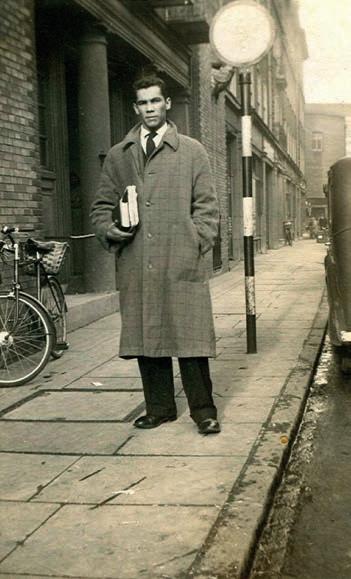
Within three months of the outbreak of war, in December 1939, Arjan received a letter from the office of the Dean of the Barts Medical College, Sir Girling Ball, transferring him to Queens’, where the cost of living, he was advised, had been reduced from 3 to 2½ guineas a week. Ball was leaving the medical school he had modernized to assume management of the country’s emergency medical services. He was a towering figure physically, domineering in manner and irreverent, and he is immortalized as the fictional character Sir Lancelot Spratt, the irascible Senior Surgeon of the Doctor in the House series of books by Richard Gordon, who was a contemporary of Arjan’s as a medical student at Barts and Cambridge.
In the course of 1940, Arjan reached Queens’ in what was less of an evacuation than a methodical relocation initiated the previous summer, and in contrast to the haphazard organization that had characterized the
outbreak of war in 1914. The College allocated him room M1 (or “M1 Staircase” as it was called then) on the ground floor of Friars’ Building, looking across Friars’ Court to the Chapel—well before there was an Erasmus Building next door. By whatever alchemy of room allocation, in 1987 I was given this same room. By then, there was an Erasmus Building, in which one had completed a tour of duty (albeit in good company). It seemed from my father’s description, in his day M1 comprised a bedroom separate from the living room, while in my day it had been downsized to an all-in-one bed-sitter. Still, I think we were both very happy in this room and both remembered it fondly all our lives.
The hot spot for Arjan’s nights out was the Dorothy Café (known in the town as “The Dot”), a popular dance hall in Sidney Street. Overhead, the “Night Climbers of Cambridge” continued a clandestine tradition of scaling the spires of the University under the cover of darkness. While after hours there were frequent brawls between students and American airmen flying bombing runs over Germany from Cambridge airfields—not excluding Arjan, who had been an accomplished boxer in school, receiving a silver medal from the Viceroy, Lord Linlithgow, for defeating an All India Army Boxing Champion.
During the more sober daytime, rationing of food and supplies affected individuals and the College alike, as did the shortage of manpower that was changing the culture of the past. John Twigg’s History of Queens’ College records that: “in 1942 the supply of crockery and cutlery to student rooms was discontinued; and in 1943 the College shoe cleaning service was scrapped.”
Medical students were not exempt from military service, and Arjan found in the Home Guard the amateurism satirized in the situation comedy “Dad’s Army”, and an unlikely line of defense in the event of a German invasion of Britain. For students whose families were overseas, the breaks between terms were spent employed by the War Agricultural Committee, which attended to national food supplies from Cambridgeshire farms.
Arjan in Cambridge.
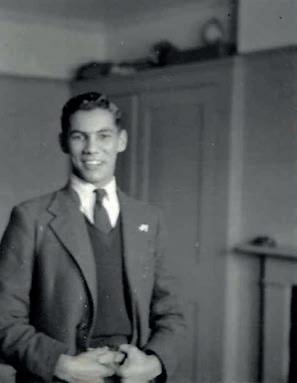
By the middle of 1943, Arjan had completed his pre-clinical education at Cambridge, and moved to Cell Barnes Hospital, originally a mental health facility that under the emergency medical services plans fell under the Barts sector of a subdivided city, where it was used to treat air-raid casualties and provide specialized care for service personnel. In Arjan’s case, this meant learning to treat airmen suffering from acute burns, in what were early practices of plastic surgery.
Meanwhile, the facilities of the Medical College at Barts, as well as the rest of the hospital, had been severely damaged during ‘the Blitz’ between September 1940 and May 1941. The laboratories, lecture theatres, pre-clinical school, and the squash courts had all been destroyed. Arjan continued his clinical education through the next waves of London’s bombardment, to the introduction of the V1 and V2 rockets. He detested and refused to go underground during air raids—inoculated by a naive sense of immunity—and given a choice, he preferred the V2. He would say that you could hear the V1 flying overhead, but when it ran out of fuel there was a dreadful silence and you had no idea where it would land and explode; while you never heard the V2 coming.
Wartime Britain was a separate continent from the indulgent 1980s, when I was at Queens’. The BBC documentary about Queens’ as a Cambridge college had been broadcast the year before, but it was somehow more on the periphery than the televised dramatization of Evelyn Waugh’s Brideshead Revisited, of which the early halcyon bits had gripped an imagination about another indulgent period
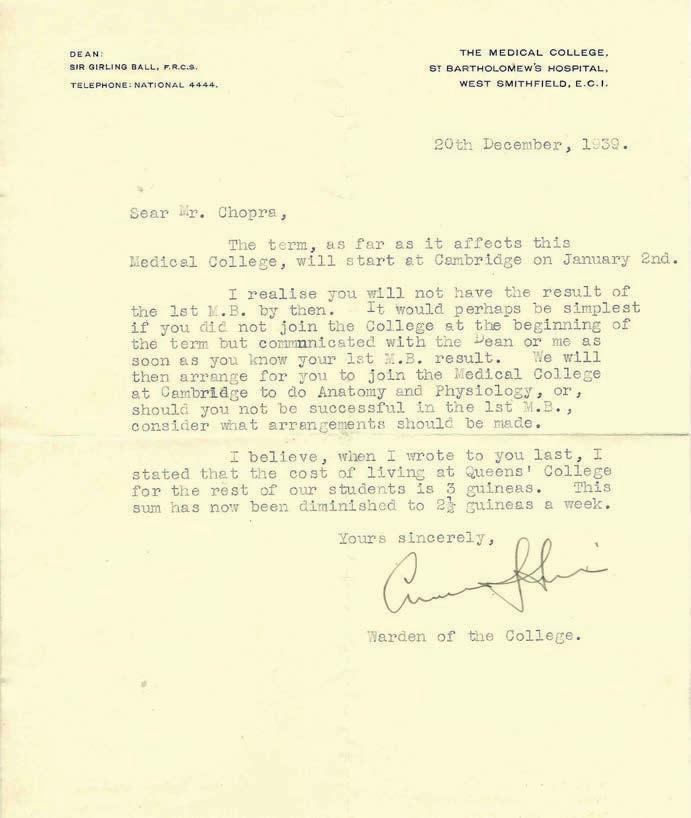
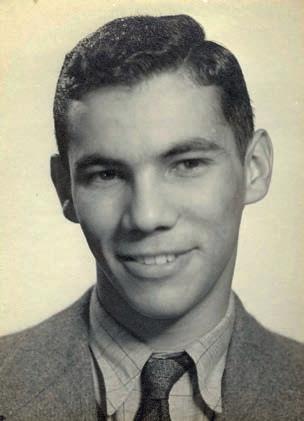
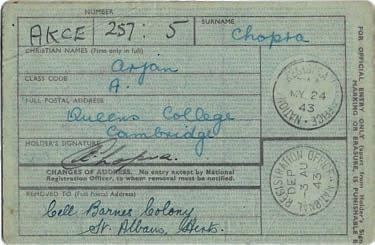
Above:
between the two world wars. And like that period following the first war, there was still in the 1980s at Cambridge, if you noticed it, a long shadow cast by the second war, in the voices of the professors who had been at places like Bletchley Park, or on the engraved plaque marking the location of the Cavendish Laboratory where the atom had been first split, or simply in the quiet memories of those present, everywhere, who had experienced the war first hand.
If it was my father’s nostalgic experience of Queens’ that inspired me to apply to only one College and none other at Cambridge, then I would say, like a strange chance encounter, the room that we had shared—nearly half a century apart—was like an intangible bridge between two vastly different intervals in history.
Top: Letter from Barts.
Left: Portriat of Arjan by Ramsay & Muspratt, Post Office Terrace, Cambridge.
Arjan’s Queens’ ID card.
Arjan in M1.
College News
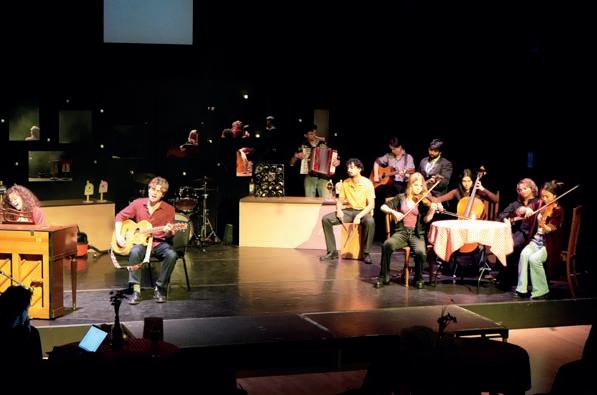
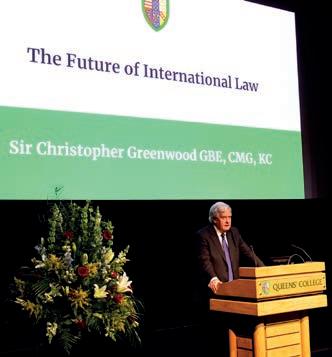
Queens’ Distinguished Lecture in Law
For the ninth instalment of this annual lecture series for students and alumni, Sir Christopher Greenwood GBS, CMG, KC spoke on ‘The Future of International Law’. Sir Christopher, Master of Magdalene College and a former judge on the International Court of Justice, offered valuable insights into the evolving landscape of international legal principles and challenges.
Scan the QR code to watch the full lecture online.

Once
The first ever collaboration between Bats and MagSoc, awardwinning musical Once, had a four-day run in Fitzpatrick Hall this Lent term.
Known for its emotional depth and minimalist staging, the musical featured actors doubling as onstage musicians throughout. Its folk-inspired score includes Falling Slowly, winner of the Academy Award for Best Original Song in 2008.
This dynamic and energetic Bats/MagSoc production blended dance, singing, acting, and live instrumental music, bringing the story to life in a truly immersive way.
Queens’ Greens Football
The President found himself in an unexpected role at a January football match between Queens’ Greens and a combined team from Caius, Hughes Hall, and St Catharine’s.
What started as an afternoon of cheering on the Queens’ team quickly took a surprising turn when it was discovered that the referee was absent.
“One moment you’re a spectator, the next you’re handed a whistle and running up and down the pitch,” Dr El-Erian posted on his social media after the match.
Bradford ParentPower
Our Schools Liaison Officer for Bradford, Dr Cathy Wardle, welcomed parents and young people from Bradford ParentPower to Queens’ to hear firsthand from our staff and Student Ambassadors about what Cambridge can offer.
Speaking about the event, Dr Wardle said: “It is a real privilege to be involved with this group of parents who have such a strong commitment to improving opportunities — not just for their own children, but for the community more widely.”
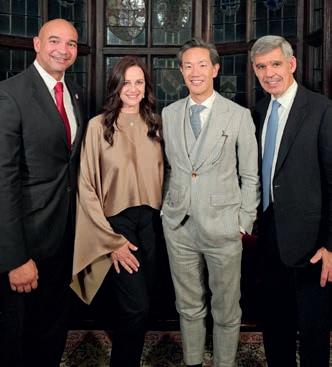
Angevin Talk, October 2024 – Tai-Heng Cheng
The Angevin Talks is an innovative speaker series hosted by Anna El-Erian at Queens’.
The series provides a platform for thoughtprovoking discussions on the critical issues shaping our world today.
The most recent talk in the series was a conversation between Anna and Tai-Heng Cheng, Co-head of Sidley’s Global Arbitration, Trade and Advocacy Practice.
L-R: Sam Beeler, Anna El-Erian, Tai-Heng Cheng, Mohamed El-Erian.
Women’s Portrait Project
The first three portraits of the Women’s Portrait Project have been completed and installed in College, celebrating notable Queens’ women who serve as an inspiration for our students, Fellows, and staff.
Dr Amma Kyei-Mensah (Honorary Fellow, 1980) is now represented in the Senior Combination Room, while portraits of Queens’ first female Fellow Professor Naomi Segal and former Chief Justice of Canada The Rt Hon Beverley McLachlin PC (College Visitor) have been placed in Cripps Hall.
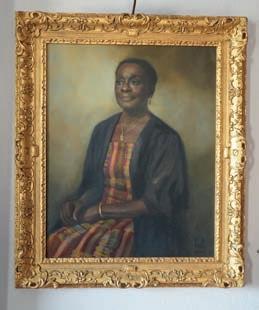

YMD Society Event
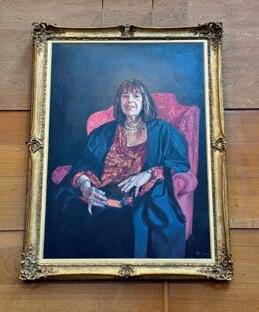
The Erasmus Project: Progress Update
The refurbishment of the Erasmus Building – the first phase of ambitious plans to decarbonise the College's estate – remains on budget, with the works scheduled for completion by June 2025. The building now features coloured panels on the windows, which are designed to increase the building's energy efficiency and feature in Sir Basil Spence's original design.
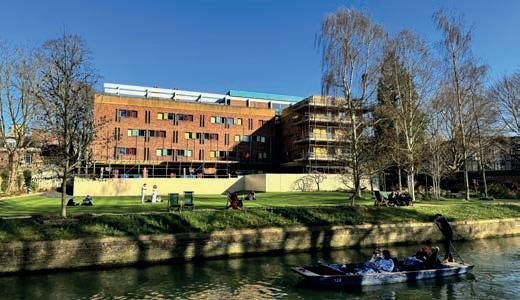
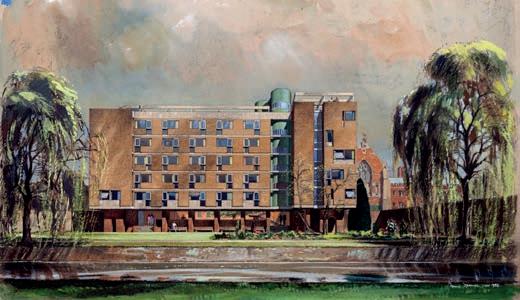
The Yen Ming Deh Society (YMD) was founded in 2023 to encourage cultural exchange among Queens’ students. Its core aim is to increase mutual understanding of, and interest in, each other’s history, language, literature, culture, politics, and economics. The society holds an event every term to further this goal.
Earlier this year, the YMD Society hosted a special Lunar New Year celebration. Students enjoyed drinks and canapés and received traditional red envelopes. Tianyi Zheng (2022) Riyazul Binmohammad (2024), Audrey Sun (2024), and Rachel Deng (2024) delivered heartfelt speeches, sharing their Lunar New Year traditions and cherished memories. The event was attended by Professor Andrew Marsham (Director of Studies, Asian and Middle Eastern Studies), Mr. Rowan Kitt (Development Director), and Qun Yang (2019, Fellow Commoner)

Portraits of Dr Amma Kyei-Mensah (above left), Professor Naomi Segal (above right) and The Rt Hon Beverley McLachlin PC (left).
The river-facing side of Erasmus now features vibrant coloured panels.
Sir Basil Spence’s original designs for Erasmus.
Intellectual Society

Mona Jebril (third from right) and guests at the Gates Cambridge Impact Awards.
Gates Cambridge Impact Prize
We are delighted to share that Dr Mona Jebril (2012, Bye-Fellow) and Dr Urbasi Sinha (2002) have been awarded the Gates Cambridge Impact Prize.
As per the announcement – “The Gates Cambridge Scholarship, the University’s flagship scholarship programme for international postgraduate students, is celebrating its 25th anniversary this year and it kicks off with a ceremony celebrating the impact scholars have made over the last quarter century.”
Dr Jebril and Dr Sinha received their awards at a ceremony in January.
Erasmus Seminar by
Dr Mohamed El-Erian
In February, President Mohamed El-Erian delivered the 8th Erasmus Seminar, titled “Bridging the Trust Gap: Economics, Economists and Public Policy.” His talk examined the rloss of public trust in economists in recent years and highlighted opportunities for meaningful improvement. The Erasmus Seminars are held termly at Darwin College.
Professor Jamie Blundell
Following a highly competitive international search, Professor Jamie Blundell was elected to the Ursula Zoellner Professorship of Cancer Research within the Department of Oncology. Professor Blundell, the Anthony L Lyster Fellow in Natural Sciences at Queens’, co-founded Synteny in 2022 – a start-up company using generative AI and high-throughput data to design precision T-cell receptor (TCR) guided therapies for cancer patients.
Reflecting on his appointment, he said: “This is an extraordinary time in cancer research, where we are gaining the ability to understand cancer at its earliest stages. This knowledge opens up new, rational approaches to predicting future cancers and intervening to prevent them from developing.”
New Fellows
Dr Sarah Williams (Official Fellow, Physics)
Dr Jerry Chen (2019) (ByeFellow, Land Economy)
Dr Alex Borodavka (ByeFellow, Chemical Engineering)
Dr Joana Nascimento (ByeFellow, Social Anthropology)
Prof Hannah Fry (Mathematics)
Professor Martin Dixon
Professor Martin Dixon has been appointed as King’s Counsel (Honoris Causa) after being nominated “for his work on property law through his scholarship, coauthorship of leading practitioner texts, and participation in, Law Commission projects.” Professor Dixon is the Director of the Cambridge Centre for Property Law and a Fellow in Law at Queens’.

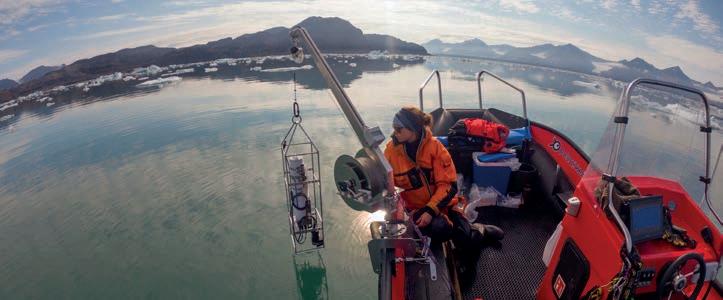
Professor Kate Hendry (2000)
We are pleased to announce that Professor Kate Hendry (2000) has been awarded the Bigsby Medal from the Geological Society of London for her contributions to geosciences.
Professor Hendry’s research interests surround the impact of climate change on marine nutrient cycling in the polar regions, most recently in understanding how ice-ocean interactions impact the chemistry of the ocean. Over the past 20 years, she has led and participated in international oceanographic and coastal marine expeditions to both the Arctic and Antarctic.
“I’ve always believed that working for the marine science community, and reaching out to other disciplines and stakeholders, is as important as frontline research.”
Dr Joana Nascimento
Dr Joana Nascimento (Bye-Fellow) has been awarded an ESRC New Investigator Grant, a prestigious award that will enable her to lead a new research project in the Department of Social Anthropology. As Principal Investigator, Dr Nascimento will explore themes of work, social reproduction, and sustainability in contemporary capitalism through her project, Rethinking work, social reproduction and “sustainable futures” in contemporary capitalism: perspectives from the Outer Hebrides of Scotland.
The Bigsby Medal, established by John Jeremiah Bigsby (1792-1881), is awarded to outstanding mid-career scientists in the geosciences.
Previous Queen’s recipients include Professor James Jackson (1973) and Professor Marie Edmonds
Professor Hendry received the news whilst at Rothera Research Station on Christmas Eve.
“It was so special to get such exciting news whilst on fieldwork, which is my favourite part of my job! It’s wonderful to be recognised in this way, but it’s only possible because I’ve been so lucky to work with such great team members. I’ve had supportive mentors and have worked with such brilliant early career researchers along the way. It’s really all thanks to them!”
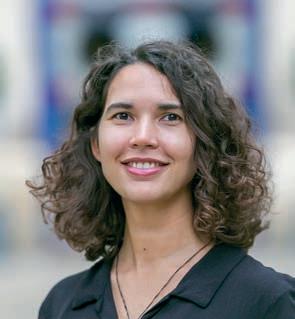
Building on her previous research in the region, the study will examine how individuals and communities in the Outer Hebrides navigate economic and social challenges, drawing on strategies that range from occupational pluralism and cooperative ventures to community land buyouts and renewable energy projects. By integrating ethnographic research with social reproduction theory, Dr Nascimento aims to shed light on how livelihood strategies and visions for ‘sustainable futures’ are being shaped, contested, and reimagined in the present.
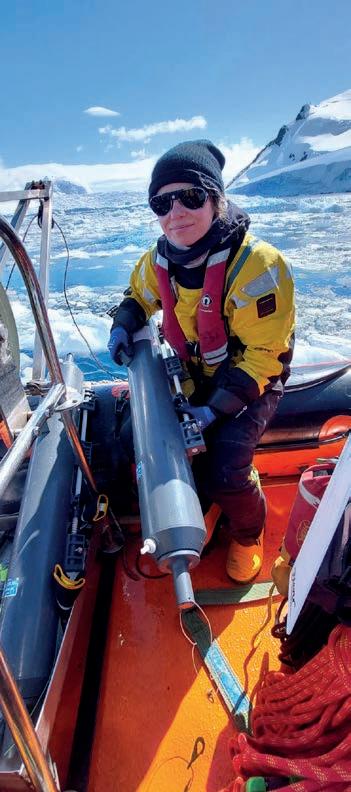
New Distinguished Academic Visitor
Queens' has appointed Reid Hoffman as a Distinguished Academic Visitor.
Best known as the co-founder of LinkedIn, Hoffman has dedicated his career to developing and investing in transformative technologies that enhance human life and experience.
Beyond LinkedIn’s success, he was an early investor in notable startups such as Airbnb, Facebook, and OpenAI. In recent years, his focus has shifted toward the responsible advancement of artificial intelligence, co-founding several AI-driven companies, including Inflection AI and Manas AI.
Earlier this year, Hoffman co-authored and released his sixth book, Superagency, which offers a perspective on what a potential roadmap to inclusive and adaptive AI could look like.
Alanna Grant Iain Rudkin
Embracing the Cambridge Experience: A Journey of Learning and Growth
Shiman (Rachel) Deng (2024) – Dr Liu Chak Wan Scholarship recipient
Walking through the historic courtyards of Cambridge, I am constantly inspired by its rich academic atmosphere. Studying for my MPhil in Psychology and Education here has been a dream come true—full of learning, challenges, and personal growth.
One of the best parts of my time at Cambridge is the people. My peers are intelligent, passionate, and curious. Every conversation, whether at a formal dinner or over coffee, brings new ideas and perspectives. Learning happens not only in the classroom but also in discussions about gender identity, cognitive development, art, music, and more.
Beyond academics, life at Cambridge is exciting. From rowing on the River Cam at dawn to attending engaging lectures and College events, there are endless opportunities to explore. Student societies offer something for everyone: whether in philosophy, poetry, music, or unique college traditions. The university’s vibrant energy makes it easy to balance study and personal interests.
Queens’ College has been a great support. The college provides both academic and personal guidance, making my journey smoother. We have had fantastic advice and encouragement at every step. With its welcoming community and beautiful surroundings, Queens’ College has truly been a home away from home.
I feel honoured to study at Cambridge with the support of the Dr Liu Chak Wan Scholarship. This opportunity allows me to fully embrace this experience, and I am deeply grateful. With this privilege comes the
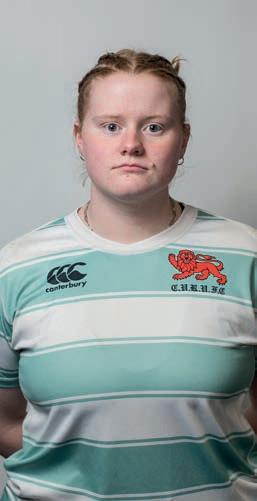
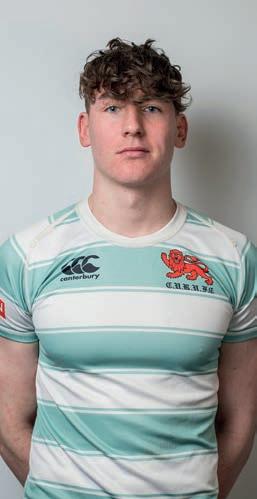
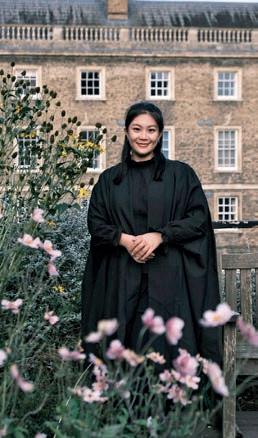
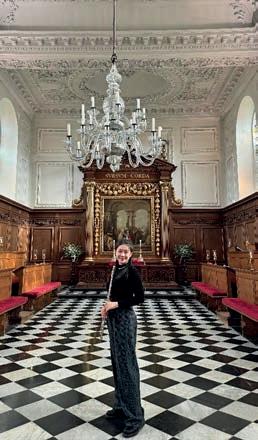
responsibility to learn, grow, and contribute. I will strive for excellence and uphold the values of my alma mater with pride.
Every day, I appreciate the privilege of being part of this extraordinary institution. Cambridge is more than a place of study. It fosters curiosity, builds lifelong friendships, and shapes the future. I look forward to making the most of this incredible chapter in my life.
Sporting Success
Ciara Boaden (2023) has won Hockey Blue for the second year in a row, while also competing as captain of the Women’s T20 Cricket Blues.
Ella Heathfield (2022) was once again awarded her Blue for Rugby, playing in the Varsity matches in March.
Aidan Beaumont (2023) was awarded his Rugby Blue and played as men’s #5 in the Blues Varsity Matches.
Toby Holmes (2023) and Femi Owolade-Coombes (2024) won their Hockey Blues, and both were on the squad for the Men’s Varsity Hockey Match in March.
Frankie Livesy-Stephens (2024) and Abbie Burton (2023) both played in the Women’s 2nd XV in the Tigers’ Varsity Match against OURFC’s Panthers in March. Abbie also won her Netball Half-Blue in February.
Izzy Lowe (2022) and Alex Durrani (2024) secured their Football Blues, playing in Varsity matches in March.
Ella Heathfield Aidan Beaumont
Events & Reunions
New York
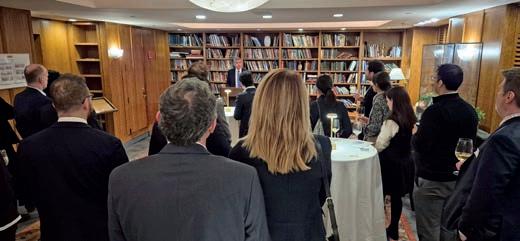
The President and Deputy Development Director hosted alumni based in New York and the surrounding areas for an evening of drinks and canapés at The Cornell Club.
Michaelmas and Spring Drinks
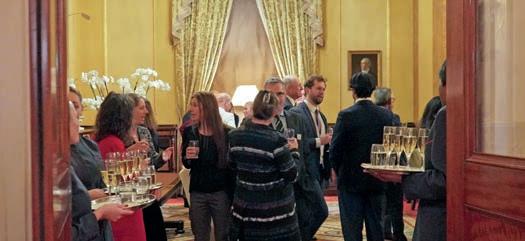
Continuing this new series of biannual events in London, alumni gathered at the Oxford and Cambridge Club in November and March for drinks with the President and Development Team.
Carol Service
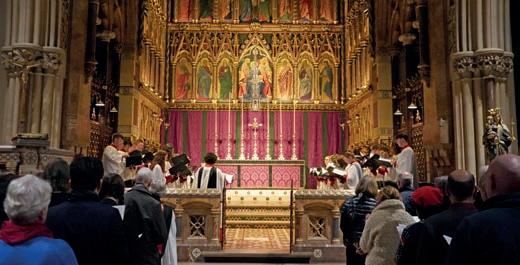
This year’s Alumni Carol Service in London was held in the beautiful All Saints Church, Margaret Street, bringing together 250 alumni and their guests for an evening of readings and carols. The service included both choral and congregational pieces, including an arrangement of We Three Kings by Stuart Nicholson, performed with special permission by Queens’ Chapel Choir.
Regional Drinks Events
Senior Development Officer Hannah Badger (2018) and Development Officer Emily Walsh continued their series of regional events for alumni, with stops in Manchester, Tunbridge Wells, and Bristol.
If you would like to organise an event for alumni in your area, please contact alumnievents@queens.cam.ac.uk for more information.
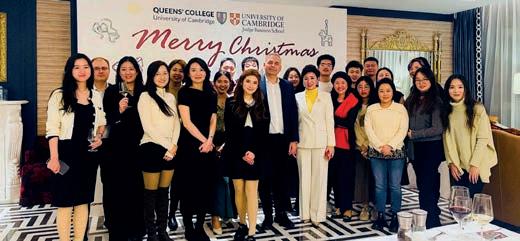
In December, Queens’ Global Ambassador for Mainland China, Ms Luya Duan (2018) organised a joint event for Queens’ and Judge Business School alumni in Shanghai. The evening featured keynote speeches from Ms Fongyee Walker (1999) and Dr Joanne Jia (2005), bringing insightful and engaging discussion to the festive gathering.
Finance Event at Deusche Bank
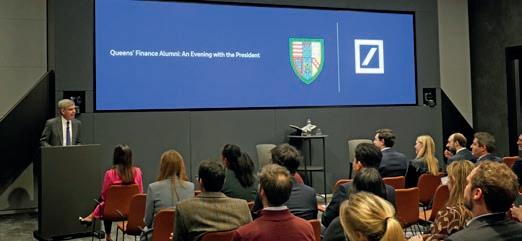
in
50th Reunion
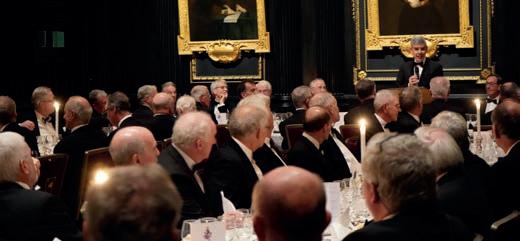
Alumni who matriculated in 1975 and 1976 were warmly invited back in February to mark the bicentenary of their matriculation, preceded by a drinks reception hosted by the President in the Long Gallery. The event coincided with Candlemas, so many alumni joined the President in attending Evensong in Chapel before the dinner.
Save the Date
Check the Alumni Events Calendar for upcoming alumni events.

Queens’ alumni working
finance attended an evening with the President at Deutsche Bank, kindly hosted by Mrs Anum Shahab (2008) and Miss Georgia Box (2022) The event included a drinks and networking reception, followed by a fascinating talk and lively Q&A with Mohamed.
From the Gardens
Steve Tyrrell, Head Gardener & Verena Downes, Senior Gardener
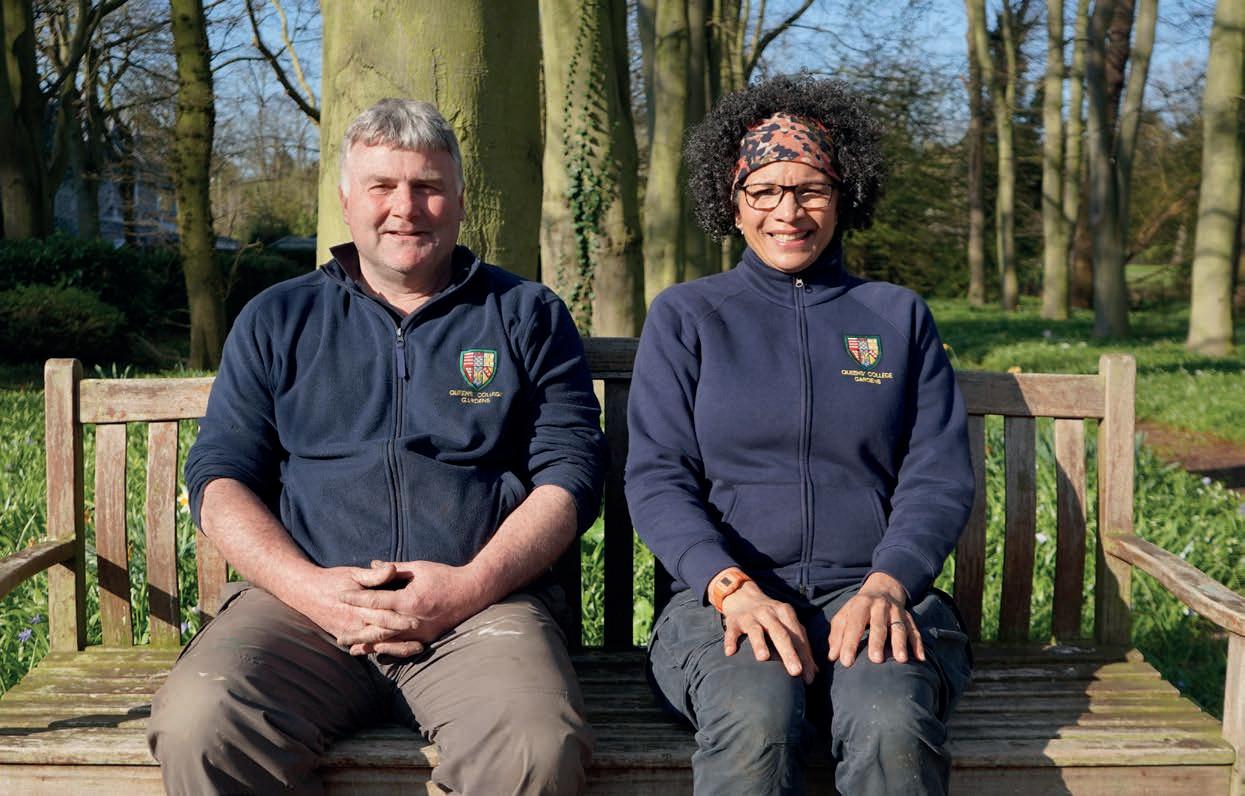
The gardens at Queens’ provide a peaceful retreat for all who step through the College gates. Behind their beauty is the dedicated work of the gardening team, who carefully maintain and evolve these historic green spaces. Steve and Verena spoke to us about the gardens, their time at Queens’, and what they enjoy most about tending to the College gardens.
What first drew you to gardening at Queens’?
Steve: I worked in agriculture research until 2002. Around this time, I felt a change of career was needed, so I looked into what else I could do as someone who liked working outside and had experience of plant husbandry. Wolfson College were looking for a person who could work in the gardens as well as help with maintenance jobs around the College, so I joined them in 2002, eventually concentrating solely on gardening. I studied and passed the RHS (Royal Horticultural Society) Level 2 and Level 3 during my 10 years at Wolfson. I applied for the Head gardener job here at Queens’ in 2012 and I was fortunate to be offered the position.
Verena: I had a long career in HR, but since about 15 years ago I’ve really enjoyed gardening. I started to garden at home because we had a nice garden, then an allotment, and I thought I’d quite like to learn a bit more about gardening and how to do it well. I enrolled on an RHS Level 2 evening class and, towards the end of my studies, I wanted to get some experience
and I was fortunate to be able to volunteer at Anglesey Abbey. I volunteered there one day a week, and that experience made me realise that, yes, I did want to be a professional gardener. It also made me think that I’d like to work in a historic setting, so in 2019 I applied for roles in Colleges. I first got a job at Corpus Christi, then four months later came over to Queens’. Since then, I’ve completed my Level 3 as well, supported by the College. I always think how lucky I am, it feels like a privilege to be here.

What do you enjoy most about your roles?
S: I enjoy the atmosphere of the place, the history. I like history, so working somewhere that’s been around since 1448, there’s a lot of history! I’m not an office person, so working outdoors and being practical is really important for me to enjoy my work. I’m grateful that, for the most part, we’re left to get on with our jobs. Having creative freedom, you get more out of people. I like to let the team have responsibility and use their ideas to create something wonderful. To be able to express ourselves, planting the way we want – it’s very satisfying to see the results at the end of the year, or the end of the summer, and to get reactions to it. In some jobs you don’t get that, so it’s great to have that appreciation of your efforts.
V: I think, for me, it’s being outdoors and close to nature. We are part of nature, and I like that we can help biodiversity thrive in our garden practice. I enjoy the fact that Steve gives us that freedom and ownership of our areas, and it’s so nice to get feedback. Ultimately, we’re just trying to create a welcoming environment.
S: It’s the first thing people see when they come in through the Porter’s Lodge. They see the work we’ve done and think ‘Oh, I want to come to this College’. It’s important that everything comes together, that the grounds and gardens look their best, so that’s the aim and that’s the enjoyment we get out of it, looking after the College and making it a pleasant place.
The mulberry tree in Cripps.
“ We just really want to spread the message –come and enjoy the gardens.”
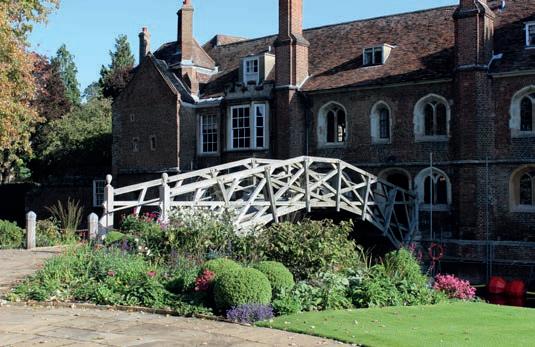
V: We have communication with the conferencing department, so we know when there are weddings, when there are graduations, open days and so on, so we make a particular effort in an area that we know is going to be used for photography or is going to have more footfall. We try our hardest to give an all-year-round display for everyone, but at certain times – for example, May Ball – there’s remedial work that we do to try and make everything look absolutely fantastic.
Are there any unique or historic plants at the College?
S: There are two elm trees in the Grove that survived the widespread Dutch elm disease which killed the majority of elm trees in Cambridgeshire and other counties. Ours are believed to be the tallest in the country, about 145ft tall. I think they were planted around the late 18th century.
The mulberry tree in Cripps was propagated from a tree in the old walled garden that was replaced by the Cripps building. The original tree was planted in the late 17th century. When the walled garden was replaced, they took limbs from the original tree and one of the three stubs grew, resulting in the tree we’ve got now.
Do you have a favourite spot in the gardens?
S: I’d say for me it’s in the President’s Garden, because it’s private. It’s nice to get away from the hustle and bustle of what’s going on outside the wall, to go into that private garden and just sit down and enjoy it. It’s a lovely place in the summer and early spring with all the colour in there. When I want to go and think, I go and think in the President’s Garden.
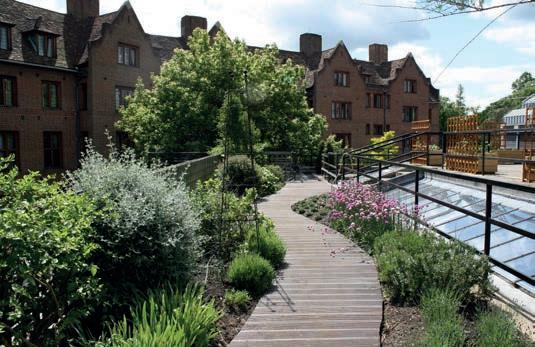

V: For me, it’s the Grove. I think it’s a very special place. Most people will go to see the Grove when there are spring bulbs or flowers; when it’s just an abundance of colour, and it’s gorgeous and glorious – but I like it equally when it’s a dust bowl in there and it’s just a shady, cool space in the middle of summer, and you’ve got bird noises. It’s got a really lovely atmosphere. It’s something that I’d encourage anyone to do – go and sit in there, be in there, and enjoy it.
We want to encourage students to get out and enjoy the gardens in general. Have they been to the roof garden? Some people don’t even know it’s there. Have they been to the Grove? Even if you spend 15 minutes in nature, you’re going to get some health benefits, you’re going to feel less stressed. We just really want to spread the message – come and enjoy the gardens. They’re there for your enjoyment.
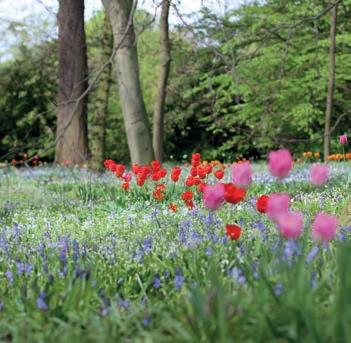
Top left: The Bridge and Round. Top right: The roof garden. Middle: The President’s Garden. Above: The Grove.

Grove, looking towards Erasmus
